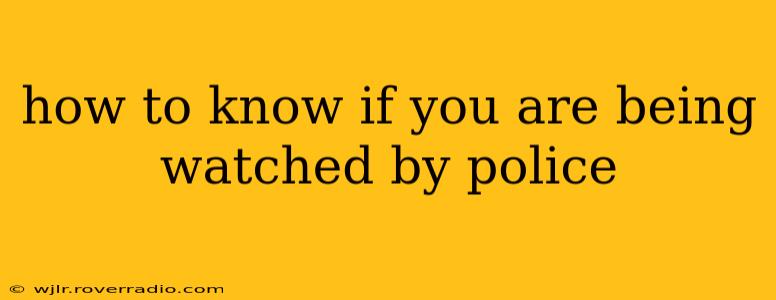Feeling like you're being followed can be unsettling, and wondering if it's the police adds another layer of concern. While there's no foolproof method to definitively know if law enforcement is surveilling you, understanding common surveillance techniques and recognizing potential signs can help alleviate anxiety and guide your actions. This guide will explore various methods police might use for surveillance and how to identify possible indicators. Remember, this information is for educational purposes and should not be interpreted as legal advice.
What are Common Police Surveillance Techniques?
Law enforcement agencies employ a range of surveillance methods, depending on the situation and available resources. These techniques can range from overt to highly covert operations.
-
Undercover Officers: Plainclothes officers might blend into crowds, follow you, or even engage in casual conversations to gather information. This is a common and often difficult-to-detect method.
-
Visible Patrol Cars: A marked police car repeatedly driving past your location, or lingering nearby, might indicate observation. However, this could also be routine patrol.
-
Unmarked Vehicles: Unmarked cars following you, changing positions, or frequently appearing near your residence or workplace are more suggestive of surveillance. Look for vehicles that appear to be maintaining a consistent distance.
-
Electronic Surveillance: This can include GPS tracking devices on your vehicle, phone tracking (with or without a warrant), and other technological methods. Detecting this is significantly harder without specialized equipment.
-
Physical Surveillance: This involves officers observing you directly, often from a distance using binoculars or other visual aids. They might be stationed in buildings overlooking your location or using hidden cameras.
-
Informants: In some cases, the police might use informants to gather information about your activities. This method is covert and virtually impossible to detect.
Signs You Might Be Under Surveillance
Several subtle cues could suggest you're being watched, but it's crucial to remember that these are indicators, not definitive proof. Context is key; a single instance isn't cause for alarm, but a pattern of these behaviors warrants further consideration.
-
Unexplained Vehicles: Repeated sightings of the same unfamiliar vehicle(s) near your home, workplace, or usual haunts.
-
Individuals Loitering: People seemingly loitering near your home or places you frequent without apparent reason.
-
Changes in Routine: Noticeable changes in the usual activity in your neighborhood, such as increased patrols or unfamiliar vehicles parked near your home.
-
Following: Feeling like you're being followed, especially by vehicles that repeatedly change position or maintain a distance.
-
Unusual Phone Activity: While difficult to detect, unexpected battery drain, overheating, or unusually high data usage could suggest monitoring.
What if I Think I'm Being Watched?
If you genuinely believe you are being subjected to police surveillance, consider the following:
-
Document Everything: Keep a detailed record of any suspicious activity, including dates, times, descriptions of vehicles and individuals, and locations.
-
Vary Your Routine: Changing your daily routines can make surveillance more challenging.
-
Consult an Attorney: If you are concerned about potential illegal surveillance, consulting a lawyer is crucial. They can advise you on your rights and legal options.
Am I Being Followed Legally?
Law enforcement agencies must operate within the bounds of the law. Surveillance generally requires a warrant based on probable cause, although exceptions exist for certain circumstances. The legality of surveillance depends heavily on the specific circumstances, applicable laws, and whether proper procedures were followed.
Can I Detect Electronic Surveillance?
Detecting electronic surveillance requires specialized equipment and expertise. Simple methods like checking for hidden cameras or listening devices might uncover overt devices but won't detect more sophisticated technologies. It's advisable to consult a professional specializing in electronic countermeasures if you have serious concerns.
Is it paranoia or legitimate concern?
Distinguishing between genuine surveillance and paranoia is critical. If your suspicions are based on a pattern of consistent observations, rather than isolated incidents, it's worth considering the possibility of surveillance. However, if your suspicions arise from anxiety or unfounded fears, professional help might be beneficial.
This information should not be considered legal advice. If you have concerns about police surveillance, consult with a legal professional for personalized guidance. Remember to remain calm and prioritize your safety.
